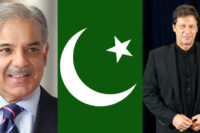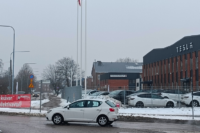
USA och Kina delar ett gemensamt öde. Tillsammans sjunker eller reser sig de två stormakterna.
By a twist of fate, the world’s two most powerful countries elected their new leaders in the same week. On the surface, they are almost perfect mirrors of each other.
While the U.S. election promises a nail-biting finish, the results are likely to be predictable. In Beijing, the next leader – Xi Jinping – was ordained several years ago to be appointed General Secretary of the Chinese Communist Party at the Party Congress this week.
In the economic realm, the two countries’ trajectories are at odds. While Washington is suffering from an austerity crisis, China is coming to grips with a crisis of affluence. In the U.S., as Thomas Byrne Edsdall argues in his book The Age of Austerity, “The two major political parties are enmeshed in a death struggle to protect the benefits and goods that flow to their respective bases, each attempting to expropriate the resources of the other.”
In China, leaders have the resources to stimulate another decade of double-digit growth. However, they know their economic model, based on cheap exports and domestic investment, is unsustainable in the long run. They know they need to end artificially low interest rates and build a social safety net to encourage Chinese citizens to consume more. The problem is that they do not know how to rebalance the economy without harming the interests of the crony capitalists who support it or the middle class that has benefited from China’s rise. China’s pursuit of affluence could become a trap from which it may struggle to escape.
While both nations are focused on their global standing, they have opposing problems in the foreign policy realm. In Washington, President Barack Obama won’t dare talk about the decline of American prominence in the global economy, but they grapple with the challenges of reconciling America’s will for power with the war-weariness of its citizens.
China, on the other hand, is struggling to manage a surge in its global influence. For more than a generation, Beijing’s foreign policy has been based on the idea of eschewing leadership in exchange for an invisible rise ‑ “hiding brightness and nourishing obscurity,” as Deng Xiaoping put it. But it is hard to downplay your influence when you have the second-largest economy in the world, double-digit rises in military spending and companies spread across the globe. It is even harder when you have hundreds of millions of nationalist citizens who want an assertive foreign policy to match China’s rising heft. As a result, it is proving impossible to avoid other Asian states joining hands with the United States in an anti-China coalition.
American politics has been defined by a crisis of disunity. The extreme partisanship of the Beltway has made the country practically ungovernable. Since Obama was elected in 2008, the Republicans have been more interested in dragging him down than in passing any legislation.
China, on the other hand, suffers from the opposite problem. Since the Tiananmen Square massacre in 1989, its elites have been so afraid of unrest that they have tried to suppress any hint of dissent. But today the country is becoming ever more complex and conflicted about where it should go.
When a battle of ideas burst out last year between the charismatic leftist governor of Chongqing, Bo Xilai, and his more liberal counterpart, Wang Yang, in Guangdong, party elders moved quickly to calm things down. (Bo was expelled from the party; Wang has become more quiescent). A big question is whether this push for control at the highest levels and at the grass roots will stop China from making the radical decisions it needs, and in the process fuel a potentially violent backlash. Professor Sun Liping, of Tsinghua University, thinks it will: “The ultimate outcome of the massive stability preservation project”, he is quoted as saying in my new book, “China 3.0,” “is in fact the intensification of social tensions”. Sun, one of China’s leading sociologists, was also the Ph.D. supervisor of one Xi Jinping.
Although they look like opposites, the United States and China suffer from the same problems: They are introspective, self-destructive and interdependent. China’s ying is often the cause of America’s yang. Its bond buying fuels America’s consumption; its surge in power threatens American leadership; and the decisiveness of its closed political system in the financial crisis caused leading Americans to question the sustainability of America’s open society. The big question facing the world now is whether either leadership transition will bring relief from the multiple crises the two nations face.
Unfortunately for the world’s most powerful nations, the answer will depend on events on the other side of the Pacific. America and China are fated to sink or swim together.
Mark Leonard is a British journalist and author.
Fotnot: Texten är tidigare publicerad på Mark Leonards blogg på Reuters.com och publiceras med tillstånd av författaren (the text has previously been published on Mark Leonard’s blog at Reuters.com and is re-published by kind permission by the author. Reuters retain the copyright.).
Följ Dagens Arena på Facebook och Twitter, och prenumerera på vårt nyhetsbrev för att ta del av granskande journalistik, nyheter, opinion och fördjupning.

































